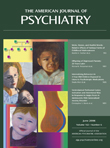To the Editor: In the March issue of the
Journal, Stefan P. Kruszewski, M.D. correctly noted that the
Physicians’ Desk Reference lists euphoria among the possible effects of modafinil. Dr. Kruszewski legitimately disagreed with the following statement about modafinil
(1) : “The medication has not been reported to produce euphoria, and there has been no indication of excessive use or abuse in clinical trials” (p. 549). However, he incorrectly concluded that our group’s research on modafinil fails to support the lack of euphoria. We recently reported that modafinil promoted abstinence in cocaine-dependent subjects (N=62) during an 8-week placebo-controlled trial
(2) . We assessed modafinil abuse/overuse by dispensing a 9-day supply of study medications each week and analyzing pill return rates in the modafinil (N=30) and placebo (N=32) groups. There were no significant differences between the modafinil-treated and placebo-treated groups on pill return rates (χ
2 =0.01, df=1, p=0.93), and the Mann-Whitney test showed no differences between the groups (z=–0.14, p=0.99) on pill return rates. Cocaine-addicted patients are arguably the most likely to abuse any substance that produces stimulant-like euphoria and are therefore unlikely to return pills that actually produce euphoria. Rather than producing additive euphoria when mixed with cocaine, modafinil blunts cocaine-induced euphoria under controlled laboratory conditions
(3,
4) .
Modafinil is a schedule IV medication under the Controlled Substances Act and is chemically unrelated to central stimulants. It binds the dopamine transporter with an affinity that is well below that of the unscheduled antidepressant bupropion, also listed as producing euphoria by the
PDR . Other studies
(5) have reported that modafinil did not produce amphetamine-like effects and was indistinguishable from caffeine; that, in comparison with methylphenidate and placebo, modafinil “is not an amphetamine-like agent,”
(6) and that subjects with a history of heavy cocaine abuse could not discriminate the cocaine-like effects of modafinil under controlled conditions. Only one study reported that women with a history of cocaine dependence (N=12) could discriminate some amphetamine-like effects of modafinil
(7) . Based on these premarketing studies, the Food and Drug Administration/Drug Enforcement Administration did not schedule modafinil along with methylphenidate and other stimulants in schedule II but rather in the less restrictive schedule IV. Postmarketing surveillance and animal studies suggest that modafinil has little potential for abuse. We therefore believe that modafinil has not been convincingly reported to produce euphoria, and there has been no indication of excessive use or abuse in clinical trials among individuals with cocaine dependence.

